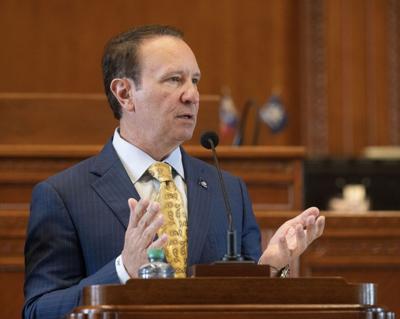Gov. Jeff Landry’s plan for a limited, rapid-fire constitutional convention will face its biggest test Tuesday afternoon, when the governor once again tries to convince two-thirds of the House of Representatives to support his controversial proposal, which has drawn pushback from lawmakers as well as voters.
Landry tried last Wednesday to garner the required 70 House votes for the convention’s enabling legislation, which is set forth in House Bill 800 by Rep. Beau Beaullieu, R-New Iberia.
He didn’t have the votes.
Landry therefore offered a political balm, agreeing to amend HB 800 by taking the $75,000 homestead exemption and state funding for K-12 schools off the table — and scrubbing his idea of allowing private money to pay for the convention.
The homestead exemption and the K-12 Minimum Foundation Formula are enshrined in the 1974 constitution. Shielding those two sacred cows represents a concession as well as a gamble by Landry.
As Senate President Cameron Henry, R-Metairie, noted afterward, that kind of compromise could “open the floodgates to others” looking for exceptions. On cue, sheriffs, district attorneys and other special interests quickly began pressing their cases.
Why bother?
Delegates at the 1973 constitutional convention completely ignored their enabling legislation, according to LaPolitics.com publisher Jeremy Alford, whose book, “The Last Constitution,” chronicled that historic rewrite. (Disclosure: I edited Alford’s book, but I have no financial interest in its sales.)
The same could happen if Landry convinces lawmakers to meet as delegates this year. Which means the homestead exemption, K-12 education funding and every other protected political fiefdom could still be on the cutting table.
Something tells me Landry knows that, which may explain his willingness to compromise.
For now.
The governor initially proposed an eight-week convention running from May 20 to July 15. He shifted to a two-week “con-con” after Henry informed him that his original schedule was a nonstarter in the Senate. Henry has expressed doubts about the two-week gathering as well, suggesting that the convention — if it happens at all — should run three weeks, beginning in early August.
Getting buy-in from lawmakers is just the beginning of Landry’s challenges. Recent polls suggest voters are wary of a truncated convention that all but forecloses their input — and gives them no say whatsoever in selecting or serving as delegates.
A poll commissioned by this newspaper and conducted by veteran pollster and analyst Ron Faucheux found that only 1% of Louisiana voters identified a new constitution as a top priority. They listed seven other issues ahead of it.
Another statewide poll, commissioned by Louisiana Voters for Constitutional Integrity and conducted a month ago by Global Strategy Group, showed that a whopping 82% of those interviewed said voters (not lawmakers and Landry) should choose the delegates.
Moreover, 73% said Landry’s proposed convention is “happening too quickly and needs to be slowed down” — while 81% said it “gives too much power to special interests and big corporations.”
“These concerns carry across party lines,” the polling report states.
That likely explains why Landry is already hitting the conservative radio talk show circuit in an effort to sell his “limited” constitutional convention idea. One of his top legislative allies, House Speaker Phillip DeVillier, R-Eunice, tweeted that it's time to "refresh" the 1974 charter.
More than anything, Landry wants to put the proposed constitutional rewrite on the Nov. 5 presidential ballot. That would guarantee a large conservative turnout that could enhance its chances of success — especially if Donald Trump, the presumptive GOP nominee, endorses it.
Landry may face yet another challenge, however. The current constitution specifies how a constitutional convention may be called — and it doesn’t expressly allow for a “limited” convention.
In fact, lawmakers tried that idea decades ago — and failed miserably.
In 1992, lawmakers declared themselves delegates to a “limited” convention that focused on removing or revising fiscal constraints on taxation and spending, just as Landry now proposes. In a November 1992 referendum — which coincided with a presidential ballot — voters soundly rejected (by a 62-38 percent margin) that convention’s “all or nothing” set of amendments.
Tellingly, voters that same day also rejected — by a 61-39 percent margin — a separate amendment to allow for “limited” constitutional conventions.
That may portend Landry’s biggest hurdle of all: a legal challenge based on a lack of authority to hold a “limited” convention, even if he can muster a two-thirds vote in the House and Senate.
Unless, of course, the Louisiana Supreme Court chooses to ignore the express will of Louisiana voters on that subject.

